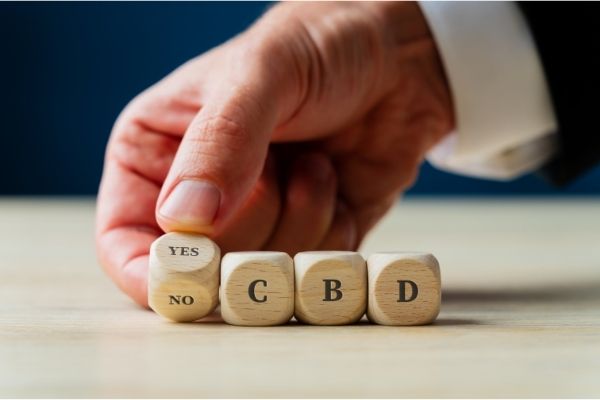Many People Still Don’t Know The Benefits Of CBD In Their Life, And They Are Missing Out!
So much has been discovered about CBD in recent years, and the popularity of its products only continues to grow. But despite these recent advances, there are still many misconceptions surrounding CBD. CBD and its products do many good things, but there is a fair amount of misinformation surrounding them that people tend to believe. Luckily, we are here to talk about some of those misconceptions and what the number one thing is that people get wrong about CBD.

What is CBD?
Cannabidiol, more popularly referred to as CBD, is a cannabinoid found in the cannabis plants hemp and marijuana. It was first isolated by scientists in the 1930s, and has slowly gained popularity and acceptance over the past several decades with a spike in popularity in the past few years.
It’s the topic of several research projects due to the discovery of the health benefits that it can provide including the treatment of anxiety and pain.
CBD comes in a variety of products, with some of the most popular including:
- Edibles
- Oils
- Topicals
- Smokables
Common Misconceptions About CBD
A lot has been discovered about CBD in recent years, especially with the increasing number of research projects being conducted that study hemp and its derivatives. But just because researchers and scientists understand more about CBD doesn’t mean that consumers have also kept themselves informed.
There are still many common misconceptions about CBD that exist today, with some of the most popular being:
- CBD is illegal
- CBD works instantly
- CBD is a marijuana product
- CBD is a placebo
Let’s take a look at some of these one by one.
CBD is Illegal
The Agriculture Improvement Act of 2018, also known as the 2018 Farm Bill, was signed into law on December 20th, 2018, and changed the definition of marijuana to exclude hemp as long as the plant material contained 0.3 percent or less of THC. Consequently, hemp and its derivatives, such as CBD, also became legal for production and sale.
The one exception to CBD’s legality is that the FDA doesn’t allow CBD in food and drinks, however more and more states are moving to make CBD legal in food and drinks.
Because states have their own independent rights to create laws surrounding hemp, some CBD products sit in a gray area of legality. For example, you can purchase smokable hemp in several states. However, Texas has outlawed smokable hemp flowers.

CBD Is A Marijuana Product
The majority of consumers can’t tell the difference between a hemp and a marijuana leaf, leading them to believe that CBD products belong to the more popular of the two. However, CBD products are derived from hemp, not marijuana.
Marijuana’s primary chemical component is THC, while hemp is grown in a specific way to ensure that CBD is the primary chemical compound being produced. The two plants are very different, and have very different laws surrounding them as well.
CBD Works Instantly
Because so many people believe CBD is a derivative of marijuana, they expect immediate results upon taking CBD.
Although some CBD products work faster than others, such as smokables and topicals, using CBD for overall relief is a process that takes time. Once you have a consistent schedule with taking CBD, you will have a constant flow of it in your body that’s constantly working to reduce your symptoms.
CBD Is a Placebo
Some people believe that CBD only works as a placebo, meaning that it’s only made to make you believe you’re getting results when in reality, nothing is happening.
It’s important to understand that CBD is not a placebo, and its effects on the body are real. If CBD were a placebo, it would have been discovered by scientists long ago and not nearly as much time would be spent on research in the present day.
You can find a lot of stories online to counter this misconception as well. Many people love to share their CBD success stories to help spread awareness of its uses.
The #1 Thing People Get Wrong About CBD
Above all other misconceptions about CBD, there is one that wears the crown. One that takes the cake. One that rises above the rest. One that….well, you get the point.
CBD Can Get You High
The biggest misconception about CBD is that you can get high from using it. Again, it’s believed that this misconception is bred from the belief that CBD is a product of the marijuana plant. It also contributes to the belief people have that CBD should work instantly. They expect the CBD to “hit” them similar to how THC does when smoked. But there is a big difference between the two compounds.

CBD
Nonintoxicating
Derived from hemp
Provides a feeling of relaxation
THC
Intoxicating
Derived from marijuana
Provides a feeling of euphoria
CBD is non intoxicating, meaning it won’t alter your mind in any way that gives you a “buzzed” feeling. No matter how much CBD you consume (and we don’t recommend trying it) you will not get high from using it.
People believe they will get the same high from using CBD as the one from marijuana. The THC from marijuana creates a euphoric effect for the user. The euphoric effect is often referred to as “being stoned.” Instead of a euphoric high feeling, CBD will result in an overall feeling of relaxation. Instead of raising your heart rate, it is known to lower it and help provide relief for feelings of anxiousness; something that THC can cause.
To state it plainly CBD will not get you high
What Causes These Misconceptions?
The source of the misconceptions surrounding CBD is no different than misconceptions surrounding any subject: the spread of misinformation. There are also a couple of other factors that are worth noting when it comes to misconceptions about CBD. Fake advertisements and lack of regulations.

Fake Advertisements
Fake Advertisements are responsible for a lot of misinformation surrounding CBD products, especially when the ad is pushing a fake CBD product.
When Covid-19 was originally announced as a pandemic, there was a massive spike in predatory companies advertising their CBD products as “miracle cures” for symptoms associated with the coronavirus. Luckily, the U.S. Food and Drug Administration (FDA) was able to step in and issue warning letters to these companies to change their marketing or face a shut down.
Lack of regulations
The FDA has been promising federal regulations for CBD products for a while, but something always seems to get in the way. As a result of “not being approved by the FDA,” CBD is believed to be dangerous by many uninformed individuals. Hopefully, as more research begins to be done, there will soon exist permanent and clear regulations for CBD, and people can begin trusting its capabilities more.
Moving Forward
Hopefully as CBD’s popularity continues to grow so will its acceptance. In the meantime, the best thing is to provide the public accurate information regarding CBD, as we at Tru Harvest try to do. If you have any questions or want to learn more about the benefits of CBD please give us a call at (540) 838-2063.



